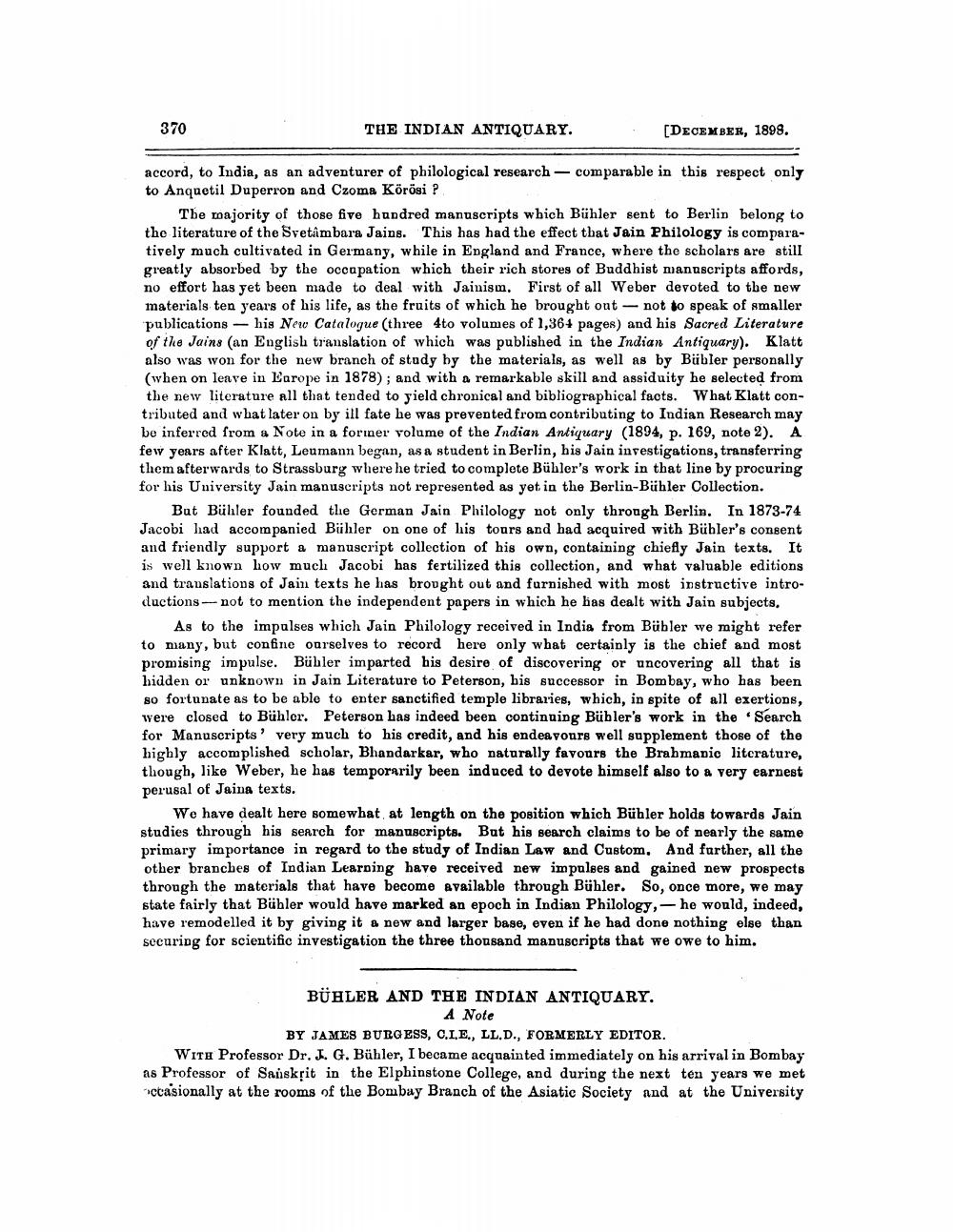________________
370
THE INDIAN ANTIQUARY.
[DECEMBER, 1898.
accord, to India, as an adventurer of philological research - comparable in this respect only to Anquetil Duperron and Czoma Körösi ?
The majority of those five hundred manuscripts which Bühler sent to Berlin belong to the literature of the Svetambara Jains. This has had the effect that Jain Philology is comparatively much cultivated in Germany, while in England and France, where the scholars are still greatly absorbed by the occupation which their rich stores of Buddhist manuscripts affords, no effort has yet been made to deal with Jainism. First of all Weber devoted to the new materials ten years of his life, as the fruits of which he brought ont - not to speak of smaller publications - his New Catalogue (three 4to volumes of 1,364 pages) and his Sacred Literature of the Jains (an English translation of which was published in the Indian Antiquary). Klatt also was won for the new branch of study by the materials, as well as by Bübler personally (when on leave in Earope in 1878); and with a remarkable skill and assiduity he selected from the new literature all that tended to yield chronical and bibliographical facts. What Klatt contributed and what later on by ill fate he was prevented from contributing to Indian Research may be inferred from a Note in a former volume of the Indian Antiquary (1894, p. 169, note 2). A few years after Klatt, Leumann began, as a student in Berlin, his Jain investigations, transferring them afterwards to Strassburg where he tried to complete Bühler's work in that line by procuring for his University Jain manuscripts not represented as yet in the Berlin-Bühler Collection.
But Bühler founded the German Jain Philology not only through Berlin. In 1873-74 Jacobi had accompanied Bühler on one of his tours and had acquired with Bühler's consent and friendly support a manuscript collection of his own, containing chiefly Jain texts. It is well known how much Jacobi has fertilized this collection, and what valuable editions and translations of Jain texts he has brought out and furnished with most instructive introductions - not to mention the independent papers in which he has dealt with Jain subjects.
As to the impulses which Jain Philology received in India from Bübler we might refer to many, but confine ourselves to record here only what certainly is the chief and most promising impulse. Bühler imparted his desire of discovering or uncovering all that is hidden or unknown in Jain Literature to Peterson, his successor in Bombay, who has been so fortunate as to be able to enter sanctified temple libraries, which, in spite of all exertions, were closed to Bühler. Peterson has indeed been continuing Bübler's work in the Search for Manuscripts' very much to his credit, and his endeavours well supplement those of the highly accomplished scholar, Bhandarkar, who naturally favours the Brabmanic literature, though, like Weber, he has temporarily been induced to devote himself also to a very earnest perusal of Jaina texts.
We have dealt here somewhat at length on the position which Bühler holds towards Jain studies through his search for manuscripts. But his search claims to be of nearly the same primary importance in regard to the study of Indian Law and Custom. And further, all the other branches of Indian Learning have received new impulses and gained new prospects through the materials that have become available through Bühler. So, once more, we may state fairly that Bübler would have marked an epoch in Indian Philology,- he would, indeed, have remodelled it by giving it a new and larger base, even if he had done nothing else than securing for scientific investigation the three thousand manuscripts that we owe to him.
BÜHLER AND THE INDIAN ANTIQUARY.
A Note BY JAMES BURGESS, C.I.E., LL.D., FORMERLY EDITOR. With Professor Dr. J. G. Bühler, I became acquainted immediately on his arrival in Bombay as Professor of Sanskrit in the Elphinstone College, and during the next ten years we met occasionally at the rooms of the Bombay Branch of the Asiatic Society and at the University




